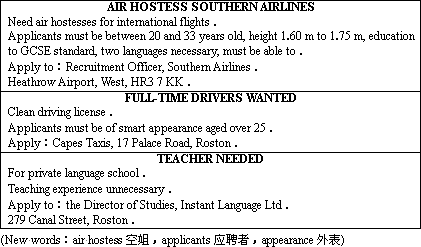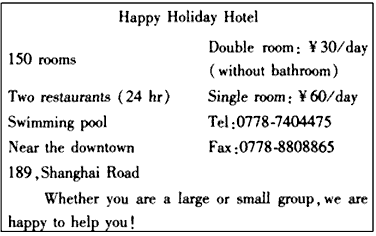题目内容
| |||||||||||||||||||||||||||||||||||||||||||||||||||||||||||

 字词句篇与同步作文达标系列答案
字词句篇与同步作文达标系列答案阅读理解
| Channel 1(一频道) | Channel 2 |
| 18:00 Around China | 15:45 Computers today |
| 18:30 Children’s program | 18:10 Foreign arts |
| 19:00 News | 18:30 Modern English |
| 19:30 Weather report | 19:00 Animal world |
| 19:40 Around the world | 19:25 In Asia |
| 20:10 TV play: Sister | 20:20 Sports |
| 21:00 English for today | 21:00 Sports player—Yao Ming |
| 21:15 Pop music | 21:45 English news |
| 21:55 Talk show | 22:05 On TV next week |
| A.TalkShow | B.Sports | C.Sportsplayer | D.TVplay |
| A.animals | B.news | C.foreignarts | D.Asia |
| A.Sports | B.Aroundtheworld | C.Foreignarts | D.Englishnews |
| A.at21:45onChannel2 | B.at21:55onChannel1 |
| C.at21:00onChannel2 | D.at21:15onChannel1 |
| A.teachesyouEnglish |
| B.tellsyousomethingaboutEnglishclassroom |
| C.letyouknowEnglishnews |
| D.helpsyoumakeforeignfriends |
阅读理解
|
Channel 1(一频道) |
Channel 2 |
|
18:00 Around China |
15:45 Computers today |
|
18:30 Children’s program |
18:10 Foreign arts |
|
19:00 News |
18:30 Modern English |
|
19:30 Weather report |
19:00 Animal world |
|
19:40 Around the world |
19:25 In Asia |
|
20:10 TV play: Sister |
20:20 Sports |
|
21:00 English for today |
21:00 Sports player—Yao Ming |
|
21:15 Pop music |
21:45 English news |
|
21:55 Talk show |
22:05 On TV next week |
1.If you want to know something about Yao Ming, the best program for you is ______.
|
A.TalkShow |
B.Sports |
C.Sportsplayer |
D.TVplay |
2. You’ll know something about ________ at 19:00 on Channel 2.
|
A.animals |
B.news |
C.foreignarts |
D.Asia |
3. If you want to watch NBA, the best program for you would be_______.
|
A.Sports |
B.Aroundtheworld |
C.Foreignarts |
D.Englishnews |
4. If you like music very much, the best program is______.
|
A.at21:45onChannel2 |
B.at21:55onChannel1 |
|
C.at21:00onChannel2 |
D.at21:15onChannel1 |
5. “Modern English” is a program that ______.
|
A.teachesyouEnglish |
|
B.tellsyousomethingaboutEnglishclassroom |
|
C.letyouknowEnglishnews |
|
D.helpsyoumakeforeignfriends |


